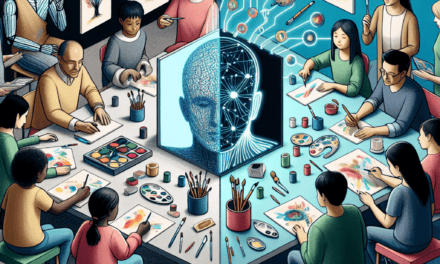Announcing the 2024 Transdisciplinary Grant Awardees
The 2024 Transdisciplinary Grant Awardees have been announced, showcasing a diverse group of researchers and innovators who are pushing the boundaries of knowledge across various fields. This year’s awardees represent a blend of disciplines, including environmental science, public health, technology, and social sciences, all united by a common goal: to address complex societal challenges through collaborative and integrative approaches. In this article, we will explore the significance of transdisciplinary research, highlight the awardees and their projects, and discuss the broader implications of their work.
The Importance of Transdisciplinary Research
Transdisciplinary research is an approach that transcends traditional disciplinary boundaries to address complex problems that cannot be solved by a single discipline alone. This methodology is increasingly recognized as essential in tackling global challenges such as climate change, public health crises, and social inequality.
- Definition and Scope: Transdisciplinary research involves collaboration among researchers from different disciplines, stakeholders, and communities. It aims to create new knowledge that is applicable in real-world contexts.
- Complexity of Modern Challenges: Many of today’s issues are multifaceted, requiring insights from various fields. For instance, climate change impacts not only the environment but also economics, health, and social structures.
- Collaboration and Innovation: By fostering collaboration, transdisciplinary research encourages innovative solutions that might not emerge within siloed disciplines. This can lead to breakthroughs in technology, policy, and practice.
- Real-World Applications: The ultimate goal of transdisciplinary research is to produce actionable knowledge that can inform policy and practice, making it highly relevant to decision-makers and communities.
- Funding and Support: Increasingly, funding agencies are prioritizing transdisciplinary projects, recognizing their potential to generate impactful outcomes.
As we delve into the profiles of the 2024 Transdisciplinary Grant Awardees, it is essential to appreciate the context in which their work is situated. The following sections will highlight the awardees, their projects, and the anticipated impact of their research.
Meet the 2024 Awardees
This year’s Transdisciplinary Grant Awardees come from a variety of backgrounds and institutions, each bringing unique perspectives and expertise to their projects. Below, we introduce the awardees and provide an overview of their research initiatives.
- Dr. Emily Chen – Environmental Sustainability: Dr. Chen’s project focuses on developing sustainable agricultural practices that integrate traditional knowledge with modern technology to enhance food security.
- Dr. Raj Patel – Public Health Innovations: Dr. Patel is working on a transdisciplinary approach to combatting urban health disparities through community engagement and policy advocacy.
- Dr. Sarah Johnson – Climate Resilience: Dr. Johnson’s research aims to create adaptive strategies for coastal communities facing the impacts of climate change, emphasizing stakeholder involvement.
- Dr. Michael Thompson – Technology and Society: Dr. Thompson is exploring the ethical implications of artificial intelligence in healthcare, seeking to bridge the gap between technology and human values.
- Dr. Lisa Nguyen – Social Justice: Dr. Nguyen’s project addresses systemic inequalities in education through a collaborative framework that includes educators, policymakers, and community leaders.
Each of these awardees exemplifies the spirit of transdisciplinary research, and their projects are poised to make significant contributions to their respective fields. Let’s take a closer look at each project and its potential impact.
Dr. Emily Chen: Sustainable Agricultural Practices
Dr. Emily Chen’s project focuses on the intersection of agriculture, technology, and sustainability. With the global population projected to reach 9.7 billion by 2050, the demand for food is expected to increase significantly. However, traditional agricultural practices often lead to environmental degradation, making it imperative to find sustainable solutions.
Dr. Chen’s research aims to develop agricultural practices that not only increase crop yields but also promote environmental health. By integrating traditional farming techniques with modern technology, her project seeks to create a holistic approach to food production. This includes:
- Utilizing Indigenous Knowledge: Dr. Chen collaborates with local farmers to incorporate indigenous agricultural practices that have been successful for generations.
- Implementing Precision Agriculture: The use of technology such as drones and sensors allows for precise monitoring of crop health and soil conditions, leading to more efficient resource use.
- Promoting Biodiversity: The project emphasizes the importance of crop diversity in building resilience against pests and climate variability.
- Community Engagement: Dr. Chen actively involves local communities in the research process, ensuring that the solutions developed are culturally appropriate and widely accepted.
- Policy Advocacy: The project also aims to influence agricultural policy by providing evidence-based recommendations for sustainable practices.
Through her work, Dr. Chen hopes to create a model for sustainable agriculture that can be replicated in other regions facing similar challenges. The anticipated outcomes include improved food security, enhanced environmental health, and strengthened community resilience.
Dr. Raj Patel: Urban Health Disparities
Dr. Raj Patel’s project addresses the pressing issue of urban health disparities, which have been exacerbated by factors such as socioeconomic status, access to healthcare, and environmental conditions. His transdisciplinary approach involves collaboration with community organizations, public health officials, and policymakers to develop innovative solutions.
The key components of Dr. Patel’s research include:
- Community-Based Participatory Research: Engaging community members in the research process ensures that their voices are heard and that the solutions developed are relevant to their needs.
- Data-Driven Insights: By analyzing health data from urban populations, Dr. Patel aims to identify patterns and root causes of health disparities.
- Policy Development: The project seeks to inform local health policies by providing evidence-based recommendations that address the social determinants of health.
- Health Education Programs: Dr. Patel plans to implement educational initiatives that empower communities to take charge of their health and advocate for necessary changes.
- Collaboration with Local Governments: Working alongside local authorities, the project aims to create sustainable health interventions that can be integrated into existing systems.
Dr. Patel’s work is particularly timely given the ongoing public health challenges posed by the COVID-19 pandemic. By addressing the root causes of health disparities, his project has the potential to improve health outcomes for vulnerable populations and promote health equity in urban settings.
Dr. Sarah Johnson: Climate Resilience in Coastal Communities
As climate change continues to pose significant threats to coastal communities, Dr. Sarah Johnson’s research focuses on developing adaptive strategies to enhance resilience. Her transdisciplinary approach involves collaboration with local governments, environmental organizations, and community members to create effective solutions.
The main objectives of Dr. Johnson’s project include:
- Risk Assessment: Conducting comprehensive assessments of climate risks faced by coastal communities, including flooding, erosion, and habitat loss.
- Stakeholder Engagement: Involving community members in the research process to ensure that their knowledge and experiences inform the development of adaptation strategies.
- Innovative Solutions: Exploring nature-based solutions, such as restoring wetlands and mangroves, to enhance coastal resilience while providing additional environmental benefits.
- Policy Recommendations: The project aims to provide actionable recommendations for local governments to integrate climate resilience into their planning processes.
- Education and Outreach: Dr. Johnson plans to implement educational programs that raise awareness about climate change impacts and promote community involvement in resilience-building efforts.
By focusing on the unique challenges faced by coastal communities, Dr. Johnson’s research has the potential to create sustainable solutions that not only protect the environment but also enhance the quality of life for residents.
Dr. Michael Thompson: Ethics of Artificial Intelligence in Healthcare
As artificial intelligence (AI) becomes increasingly integrated into healthcare, Dr. Michael Thompson’s research addresses the ethical implications of these technologies. His transdisciplinary approach brings together experts in technology, ethics, healthcare, and law to explore the challenges and opportunities presented by AI.
The key aspects of Dr. Thompson’s project include:
- Ethical Framework Development: Creating a comprehensive ethical framework for the use of AI in healthcare that considers patient rights, data privacy, and algorithmic bias.
- Stakeholder Perspectives: Engaging healthcare professionals, patients, and technologists in discussions about the ethical implications of AI applications.
- Case Studies: Analyzing real-world examples of AI implementation in healthcare to identify best practices and potential pitfalls.
- Policy Advocacy: The project aims to influence healthcare policy by providing recommendations for the responsible use of AI technologies.
- Public Awareness Campaigns: Dr. Thompson plans to launch initiatives that educate the public about the benefits and risks associated with AI in healthcare.
Through his work, Dr. Thompson seeks to ensure that the integration of AI in healthcare is guided by ethical principles that prioritize patient welfare and equity. His research has the potential to shape the future of healthcare technology and its impact on society.
Dr. Lisa Nguyen: Addressing Systemic Inequalities in Education
Dr. Lisa Nguyen’s project focuses on addressing systemic inequalities in education through a collaborative framework that includes educators, policymakers, and community leaders. Recognizing that education is a fundamental driver of social mobility, her research aims to create equitable educational opportunities for all students.
The main components of Dr. Nguyen’s research include:
- Identifying Barriers: Conducting research to identify the systemic barriers that contribute to educational inequities, such as funding disparities and access to resources.
- Collaborative Solutions: Engaging stakeholders in the development of innovative solutions that address identified barriers and promote equity in education.
- Policy Recommendations: The project aims to provide evidence-based recommendations for policymakers to create more equitable education systems.
- Community Engagement: Dr. Nguyen emphasizes the importance of involving community members in the research process to ensure that solutions are culturally relevant and widely accepted.
- Monitoring and Evaluation: Implementing mechanisms to monitor the effectiveness of proposed solutions and make necessary adjustments based on feedback.
Dr. Nguyen’s work is crucial in the context of ongoing discussions about educational equity, particularly in light of the disparities highlighted by the COVID-19 pandemic. By addressing systemic inequalities, her research has the potential to create lasting change in education systems.
Conclusion: The Future of Transdisciplinary Research
The 2024 Transdisciplinary Grant Awardees represent a diverse array of projects that exemplify the power of collaboration across disciplines. Each awardee is tackling complex societal challenges through innovative approaches that integrate knowledge from various fields. The significance of their work extends beyond academic boundaries, as it has the potential to inform policy, engage communities, and create sustainable solutions.
As we look to the future, it is clear that transdisciplinary research will play a critical role in addressing the pressing issues facing our world. By fostering collaboration, encouraging innovative thinking, and prioritizing real-world applications, researchers can create impactful solutions that benefit society as a whole.
The work of the 2024 awardees serves as an inspiring reminder of the importance of interdisciplinary collaboration in driving progress and creating a better future for all. As these projects unfold, they will undoubtedly contribute to a deeper understanding of complex challenges and pave the way for transformative change.





